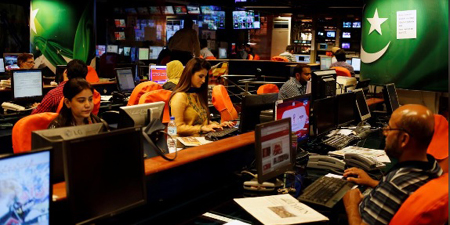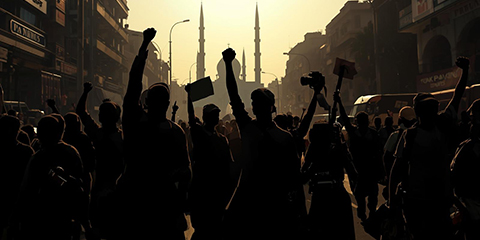Geo TV returning to air after negotiations with military - sources
JournalismPakistan.com | Published 7 years ago
Join our WhatsApp channel
ISLAMABAD/KARACHI - Pakistan’s largest TV station has been allowed back on the air at some major cable operators after talks with the military on demands it make changes in political coverage, two officials who work for the channel’s media group told Reuters on Wednesday.
After Geo TV, Pakistan’s most popular station, was taken off the air across much of the country at the end of March, military representatives pressed the channel to cease favorable coverage of ousted Prime Minister Nawaz Sharif and stop any criticism of the Supreme Court and the “establishment”, according to the two people, who had knowledge of the negotiations.
The “establishment” is a commonly used euphemism for the military in Pakistan.
Written instructions by Geo management to staff last week that were reviewed by Reuters spelled out “key editorial points that we have to manage and implement” to be restored to the airwaves.
Besides banning negative portrayals of the “establishment” and any allegations the Supreme Court might be interfering in politics, the instructions said there should be no reports on Nawaz Sharif’s ongoing corruption trial “that helps build a narrative that he and his children are innocent”.
The two sources, employees of The Jang Group of Newspapers, Geo’s parent company, said the company had reluctantly agreed to most of the military’s demands, although there was no final deal confirmed and the situation was in flux.
“As for the deal or tough conditions, we are following them, and Geo has been restored. That restoration is the result of obeying those dictations,” one of the sources said on Wednesday.
Geo TV Network President Imran Aslam declined to answer questions about any military involvement in the shutdown or whether any deal had been made or was in the works.
A Geo spokesperson said in a statement: “Geo will always strive to provide both sides of the story and an independent editorial policy for which it has suffered in every regime, military, and civilian.
“If we ever surrender on that independence we would rather shut down the channel ourselves,” added the spokesperson, who would not answer questions about any negotiations with the military.
The military’s press office did not respond to written questions and phone calls about whether it had pressured the cable operators. It also did not comment on the allegations that the military, or its powerful Inter-Services Intelligence (ISI) wing, made demands on Geo to alter its coverage or secured agreement to make any changes.
Three major cable operators, who spoke on condition of anonymity, earlier told Reuters they had pulled the channel from their rosters after direct instructions from unidentified military officers, even though the army has no official authority over the media.
The cable operators could not be immediately contacted as Geo slowly began to come back on air on Tuesday and Wednesday.
Media executives and analysts say the crackdown on Geo signals the military may be trying to control information in the run-up to a general election due within months, with the aim of preventing Sharif’s PML-N (Pakistan Muslim League-Nawaz) party from retaining its parliamentary majority.
Sharif’s supporters say the military dislikes the ousted prime minister because of his attempts to assert civilian authority over the army, but the military has several times denied any role in his ouster.
The Chief of Army Staff, General Qamar Javed Bajwa, recently declared his commitment to a democratically-elected government.
Sharif was removed from office by the Supreme Court last year over an unreported source of income. He has been barred for life from holding public office by the court.
He and his family also face trial by an anti-corruption court over accusations they improperly used offshore companies to buy expensive London properties in the 1990s without accounting for the source of the funds. A verdict, in that case, is expected next month.
Geo has been one of the few broadcast stations giving extensive coverage to Sharif’s defiant rallies around the country criticizing his ouster, but it has denied allegations by the opposition that it is a mouthpiece for his ruling party.
Founded in 2002, Geo News has consistently ranked as the most popular TV news station among Pakistan’s 208 million people. It was rated the number one watched channel in a February report by Medialogic, a rating provider.
Geo began reappearing on Tuesday in approximately half the country but had not been restored completely, network president Aslam said on Wednesday. He declined to answer questions about any military involvement in the shutdown or whether any deal had been made or was in the works.
Aslam had said last week that the channel had been effectively blocked in about 80 percent of the country and had lost millions of dollars in revenue. “There is no official reason as to who has done it, why it has been done,” he told Reuters at that time. He gave no further details on Wednesday.
Geo TV has remained on the air throughout in much of Islamabad, where most diplomats, government officials and foreign journalists are based.
Reuters interviewed nearly a dozen cable operators and Geo insiders with knowledge of the channel’s recent struggles. Three cable operators said they were pressured to take the channel off air at the end of March while others declined to comment.
Five of the Geo insiders said they knew the widespread cable blackout was a result of military pressure. However, only two were willing to talk about the conditions laid out by military officials to Geo for restoring the channels, and they said they were doing so against direct orders from the company’s owner.
One executive at a leading cable company that covers more than a million households in Pakistan told Reuters he received a telephone call at the end of March from a senior officer in the ISI telling him to take Geo TV off their roster.
There was never any question of refusing the order, he said.
A second cable executive said his company shut down Geo broadcasts after receiving a telephone call. Asked who made the call, he said: “I can’t say the name, you know, big brother, the boots.”
The military has declined to comment on all the allegations made by the cable operators.
The military has directly ruled Pakistan for almost half the country’s history since independence 70 years ago – most recently overthrowing a previous Sharif government in a 1999 coup. It remains the most powerful institution in the country, and political analysts have said that it hopes to manage Pakistan from behind the scenes without directly taking over.
The PML-N remains in control of the government and its Minister of State for Interior Affairs, Talal Chaudhry, criticized the move against Geo.
“It’s very unfortunate that behind many actions in Pakistan there are hidden hands, secret hands,” Chaudhry told Reuters in response to a question about the military’s possible role in Geo’s trouble. He did not elaborate further.
The official broadcast media regulator, Pakistan Electronic Media Regulatory Authority, said in a statement that it had not ordered any channel to be taken off the air and that the “closure of any licensed channel is against ... its laws.” - Reuters

























